Search the Special Collections and Archives Portal
Search Results

Letter from E. E. Bennett (Los Angeles) to William Reinhardt, January 4, 1952
Date
Archival Collection
Description
The Nevada State Engineer suggested that the Las Vegas Valley Water District purchase 1200 acres of "water bearing lands," but the District only wanted to purchase 679 acres.
Text
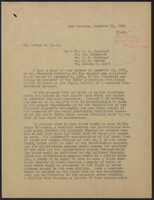
Letter from E. E. Bennett (Los Angeles) to Walter R. Rouse, December 21, 1951
Date
Archival Collection
Description
Discussion of the Railroad developing its own water supply if the sale to the Las Vegas Valley Water District goes through. The shop well never supplied water to the Las Vegas Land and Water Company, so it would not go to the District.
Text
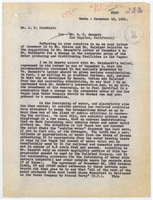
Letter from W. R. Rouse (Omaha) to A. E. Stoddard, December 18, 1951
Date
Archival Collection
Description
Suggestions that the Railroad should develop its own water so that it will not be subject to rationing as experienced by other water districts. Dividing the water production from all other assets of the Las Vegas Land and Water Company may be the best option for the Railroad to protect its water rights.
Text

Letter from Hugh A. Shamberger (Carson City) to Colonel H. F. Clark (Las Vegas), December 11, 1951
Date
Archival Collection
Description
Shamberger advised the Water District to purchase the lands surrounding the Las Vegas Springs as well as other springs and wells in the area to protect its water sources in the future.
Text
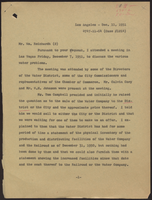
Letter from E. E. Bennett (Los Angeles) to William Reinhardt, December 11, 1951
Date
Archival Collection
Description
The Las Vegas Land and Water Company provided the water district with an inventory a year before, but no buyers made an offer yet. The letter is an account of a meeting to discuss further details of the proposed purchase. "8011-- 174-2 80-Gen." written in red pencil at head of the letter.
Text
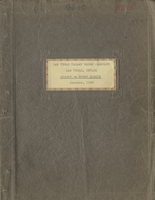
Las Vegas Valley Water District Report on water supply, October 1949
Date
Archival Collection
Description
Detailed 76 page report with charts, tables and calculations on the water situation in the Las Vegas Valley.
Text
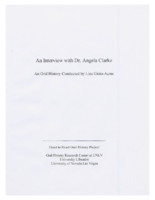
Transcript of interview with Dr. Angela Clarke by Lisa Gioia-Acres, October 3, 2008
Date
Archival Collection
Description
Interview with Dr. Angela Clarke conducted by Lisa Gioia-Acres on October 3, 2008. A native of Baltimore, Maryland, Clarke spent a great deal of time reading medical texts and started working at Social Security by the age of fourteen. Following high school, she joined the women's Air Force and attended Morgan State College on the GI Bill. Clarke recalls instances of racism and the efforts she personally made to mitigate or change circumstances for blacks. Among her many awards, she was given a plaque for integrating Air Force swimming pools. Later accepted at University of Maryland, her first year's tuition was paid by the Jessie Smith Noyes Foundation. Clarke lived and practiced medicine in Beverly Hills until 1976, when a friend suggested that she was needed in Las Vegas as a board-certified family practitioner.
Text
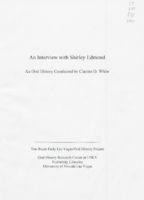
Transcript of interview with Shirley Edmond by Claytee D. White, June 24, 2010
Date
Archival Collection
Description
Interview with Shirley Edmond conducted by Claytee D. White on June 24, 2010. Born in Las Vegas, Edmond was the first African American woman in Southern Nevada promoted by the United States Post Office to be a supervisor. Edmond describes growing up in the Westside neighborhood of Las Vegas as the daughter of a local preacher. She shares memories of community stores, neighborhood landmarks, and her work at the Post Office and Matt Kelly Elementary School. Edmond's husband, Mackie, also contributes to the interview.
Text

Transcript of interview with Hazel Gay by Claytee D. White, December 2, 1995
Date
Archival Collection
Description
Interview with Hazel Gay conducted by Claytee D. White on December 2, 1995. Hazel and her husband Jimmy Gay moved to Las Vegas in 1946, becoming leaders in the African American community during the civil rights era.
Text

James A. Gay III interview, 1973: transcript
Date
Archival Collection
Description
Interview with James A. Gay III conducted by Joyce M. Wright in 1973. Edited by Elizabeth Nelson Patrick, and transcribed for the project "Black Experience in Southern Nevada, Donated Tapes Collection," James R. Dickinson Library, University of Nevada, Las Vegas, December 1978. Arriving in 1946 from Fordyce, Arkansas, Gay became the first African-American mortician in Las Vegas. He later worked as Assistant Manager of the Sands Hotel and Casino and Union Plaza while serving as an executive board member of the Culinary Union. Instrumental in the Las Vegas community, Gay worked to improved race relations, addressing social, economic, and civic issues. Gay was awarded an honorary degree from the University of Nevada, Las Vegas in 1988.
Text
